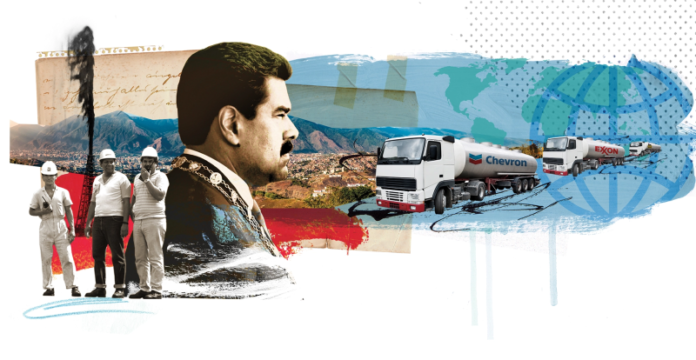Abstract
-
The U.S. is considering lifting sanctions on Venezuela to allow Chevron to resume operations and increase global oil supply.
-
Despite potential sanction relief, Venezuela’s oil production is unlikely to significantly increase in the near future.
-
The situation underscores the complexities of the global oil market and the impact of geopolitical events on energy prices.
In a bid to bolster the world’s oil supply, the U.S. is contemplating easing sanctions against the Venezuelan dictatorship. This move would potentially allow Chevron, among other companies, to resume operations in the South American nation. However, despite this potential shift in policy, experts suggest that Venezuela’s oil production is unlikely to see a significant boost in the near future.
The Sanctions and Oil Production
The U.S. sanctions on Venezuela, imposed due to the country’s authoritarian rule, have significantly impacted its oil production. Once a significant exporter of oil, Venezuela’s oil production has dwindled over the past decade due to underinvestment and sanctions. Even if sanctions are lifted, it would take months, if not years, of maintenance, preparation, and financial investments before the country can significantly increase its oil exports.
The Global Oil Market
The global oil market is currently grappling with supply challenges. The recent invasion of Ukraine by Russia has further complicated the situation, leading to increased energy prices worldwide. The potential lifting of sanctions on Venezuela is seen as a move to alleviate these pressures. However, the impact on the global oil market is expected to be limited in the near term.
The Impact on Gas Prices
The potential easing of sanctions on Venezuela comes at a time when gas prices are a significant concern for many Americans. With the midterm elections looming, the Biden administration has been trying to mitigate the impact of rising gas prices on U.S. consumers. However, the global nature of the oil market means that domestic gas prices are influenced by a range of factors beyond the control of any single government.
The Chevron Factor
Chevron, one of the largest American multinational energy corporations, had a significant presence in Venezuela before the sanctions. The potential lifting of sanctions could pave the way for Chevron to resume its operations in the country. However, the company would need to make substantial investments and undertake extensive maintenance work before it could significantly ramp up oil production.
The Venezuelan Economy and Oil
Venezuela’s economy is heavily dependent on oil, which accounts for about 99% of the country’s export revenues. The decline in oil production, coupled with the sanctions, has severely impacted the country’s economy. The potential easing of sanctions could provide some relief, but the road to economic recovery is likely to be long and challenging.
The Global Energy Landscape
The potential lifting of sanctions on Venezuela comes at a time when the global energy landscape is undergoing significant changes. The transition to renewable energy, the impact of geopolitical events, and the ongoing COVID-19 pandemic have all contributed to increased volatility in energy markets. The situation in Venezuela provides a stark reminder of the complexities and challenges of navigating this evolving landscape.
Conclusion
The potential easing of sanctions on Venezuela highlights the intricate interplay between geopolitics, economics, and the global energy market. While this move may not significantly boost Venezuela’s oil production in the near term, it underscores the ongoing efforts to navigate the challenges of the global energy landscape. As the world continues to grapple with energy supply issues and the transition to a more sustainable energy future, the situation in Venezuela serves as a poignant reminder of the complexities involved.









